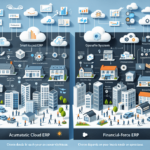Comparing NetSuite ERP and FinancialForce ERP for Optimal Business Management
Enterprise Resource Planning (ERP) systems are integral to modern businesses, facilitating the integration and management of core business processes such as financial management, procurement, sales, inventory management, and human resources. Selecting the right ERP system can significantly enhance productivity, streamline operations, and drive profitability by providing real-time data and analytics to decision-makers across the organization.
Introduction to ERP Systems
According to a Gartner report, the global ERP software market is expected to reach $56.6 billion by 2024, reflecting the growing reliance on these systems to optimize business operations. ERP systems consolidate data from various departments, eliminate data silos, and offer a unified view of the organization's performance.
Benefits of ERP Systems
- Streamlined Processes: Automation of tasks and workflows reduces manual errors and enhances productivity. For instance, businesses report up to a 30% increase in process efficiency after ERP implementation (Forrester Research).
- Scalability: ERP systems can be customized and expanded to accommodate business growth and evolving needs.
- Data-Driven Decisions: Real-time data and analytics provide insights for informed decision-making, as highlighted in a McKinsey study.
NetSuite ERP: An Overview
NetSuite ERP, a cloud-based solution, is tailored for small to mid-sized businesses. It encompasses a wide array of functionalities, including financial management, order processing, inventory management, Customer Relationship Management (CRM), e-commerce, and project management. Renowned for its flexibility and scalability, NetSuite ERP supports businesses as they expand and adapt to market changes.
Key Features of NetSuite ERP
- Financial Management: Comprehensive financial tools for accounting, budgeting, and forecasting.
- Order and Inventory Management: Efficiently manage sales orders and inventory levels.
- CRM Integration: Seamless integration with CRM systems to enhance customer interactions.
- E-commerce: Integrated e-commerce capabilities for online sales.
- Project Management: Tools for planning, tracking, and managing projects.
- Supply Chain Management: Optimize supply chain operations for better efficiency.
- Reporting and Analytics: Real-time reporting for data-driven insights.
NetSuite's robust integration capabilities allow seamless connectivity with various third-party applications, ensuring real-time data synchronization across departments. Additionally, customizable dashboards enable users to tailor the system to their specific requirements.
As of 2023, NetSuite boasts over 29,000 customers globally, underscoring its widespread adoption and reliability (NetSuite Official).
FinancialForce ERP: An Overview
FinancialForce ERP is a cloud-based solution built on the Salesforce platform, targeting mid-sized to large enterprises. It provides functionalities such as financial management, Professional Services Automation (PSA), and supply chain management. FinancialForce stands out for its advanced reporting and analytics, catering to organizations that prioritize data-driven strategies.
Key Features of FinancialForce ERP
- Financial Management: Comprehensive tools for financial planning, analysis, and reporting.
- Professional Services Automation (PSA): Manage projects, resources, and billing effectively.
- Supply Chain Management: Optimize procurement, inventory, and distribution processes.
- Reporting and Analytics: Advanced analytics for deeper business insights.
Built on the Salesforce platform, FinancialForce ERP offers seamless integration with Salesforce CRM, providing a holistic view of customer interactions and financial data. Its flexible pricing model allows businesses to pay for only the features they require, enhancing cost-effectiveness.
FinancialForce serves over 2,000 customers worldwide, including prominent enterprises across various sectors (FinancialForce Resources).
Key Features Comparison
Integration Capabilities
Both NetSuite and FinancialForce ERP offer robust integration options. NetSuite supports integration with various third-party applications such as Shopify, Magento, and Salesforce CRM, allowing businesses to streamline their operations across different platforms.
FinancialForce ERP, being built on the Salesforce platform, provides seamless integration with Salesforce Sales Cloud, Service Cloud, and other Salesforce products. Additionally, both systems offer APIs for custom integrations with other business tools, such as marketing automation, project management, and inventory systems.
User Interface and Experience
NetSuite boasts a modern and intuitive user interface with customizable dashboards and workflows, allowing businesses to tailor the system to their specific needs. FinancialForce ERP also offers a user-friendly interface, though it may require more customization to align with specific business processes.
Both platforms support mobile access through dedicated apps or browser-based interfaces, ensuring that users can access vital information on-the-go.
Security Features
Both NetSuite and FinancialForce ERP prioritize security with features such as permissions and access controls, data encryption, and regular security updates. NetSuite further enhances security with two-factor authentication and IP address restrictions.
FinancialForce offers unique features like Field Level Security, enabling administrators to control access to specific fields within records. Both systems comply with industry regulations, including SOC 1 and 2, PCI DSS, and HIPAA. Additionally, FinancialForce is compliant with GDPR, crucial for businesses operating within the European Union.
Security is a critical consideration, with ISO 27001 compliance also supported by both ERP systems, ensuring international standards for information security management.
Pricing Comparison
NetSuite offers tiered pricing plans ranging from approximately $999 per month for basic functionalities to $9,999 per month for advanced features, catering to businesses of varying sizes and needs. However, these costs can be substantial for small businesses with limited budgets.
In contrast, FinancialForce ERP utilizes a custom pricing model tailored to the specific requirements of each business. This approach allows organizations to pay only for the features and services they need, potentially reducing costs. According to a Capterra review, businesses report cost savings of up to 20% when selecting FinancialForce due to its flexible pricing structure.
Implementation Processes
NetSuite ERP Implementation
The implementation process for NetSuite ERP typically spans 3 to 12 months and includes the following steps:
- Assessment and Planning: Identifying business processes to automate and streamline, along with customization requirements and integrations.
- Data Preparation and Migration: Cleaning, organizing, and migrating data into NetSuite ERP, ensuring accuracy and completeness.
- System Configuration: Configuring the ERP system to align with business needs.
- Testing: Rigorous testing to identify and rectify any issues.
- Training: Training users to effectively utilize the new system.
According to NetSuite, businesses typically see a return on investment within the first year of implementation (NetSuite Implementation Strategies).
FinancialForce ERP Implementation
The implementation process for FinancialForce ERP typically takes between 6 to 18 months and involves the following stages:
- Assessment and Planning: Collaborating with stakeholders to determine specific business needs, evaluate current processes, and identify potential challenges.
- Data Preparation and Migration: Cleaning and migrating data to FinancialForce ERP, ensuring proper mapping and integrity.
- System Configuration: Configuring the ERP system to meet the organization's requirements.
- Testing: Conducting comprehensive testing to ensure system functionality and performance.
- Training: Providing training sessions for users to maximize system utilization.
A successful implementation of FinancialForce ERP often leads to enhanced project visibility and a 25% improvement in resource allocation efficiency (FinancialForce ERP Benefits).
Customer Support Comparison
NetSuite offers 24/7 customer support via phone, email, and chat, along with a comprehensive knowledge base and online community forums. FinancialForce provides similar support options through phone and email, as well as online resources and a community forum.
A key difference is that NetSuite's support is available around the clock, whereas FinancialForce's support is confined to weekdays during business hours, which may affect businesses requiring continuous support.
According to customer reviews on Gartner, NetSuite consistently scores higher in customer satisfaction for support responsiveness.
Security Comparison Between NetSuite and FinancialForce
Both NetSuite and FinancialForce ERP prioritize security with features such as permissions and access controls, data encryption, and regular security updates. NetSuite further enhances security with two-factor authentication and IP address restrictions.
FinancialForce offers unique features like Field Level Security, enabling administrators to control access to specific fields within records. Both systems comply with industry regulations, including SOC 1 and 2, PCI DSS, and HIPAA. Additionally, FinancialForce is compliant with GDPR, crucial for businesses operating within the European Union.
Security is a critical consideration, with ISO 27001 compliance also supported by both ERP systems, ensuring international standards for information security management.
Pros and Cons of NetSuite ERP and FinancialForce ERP
NetSuite ERP
- Pros: Highly flexible and scalable, extensive feature set, strong integration capabilities, 24/7 customer support.
- Cons: Higher cost may be prohibitive for small businesses, potentially steep learning curve for new users.
FinancialForce ERP
- Pros: Advanced reporting and analytics, seamless Salesforce integration, customizable pricing, robust project management features.
- Cons: Customization can be complex, pricing may be expensive for smaller organizations, longer implementation time.
Best ERP Choice for Different Business Sizes
Small Businesses
NetSuite ERP is generally more suitable for small businesses due to its flexibility, scalability, and comprehensive feature set. Despite its higher cost, the return on investment through improved productivity and efficiency can be substantial for growing businesses.
Large Enterprises
FinancialForce ERP is better suited for large enterprises that require sophisticated reporting and analytics, along with deep integration with Salesforce products. Its customizable pricing and extensive project management capabilities cater well to the complex needs of larger organizations.
Conclusion: Choosing the Right ERP System for Your Business
When selecting between NetSuite ERP and FinancialForce ERP, businesses must evaluate their size, specific needs, budget constraints, and growth plans. Both ERP systems offer robust features, high-level security, and reliable customer support. The optimal choice hinges on aligning the system's strengths with the organization's strategic objectives and operational requirements.






















